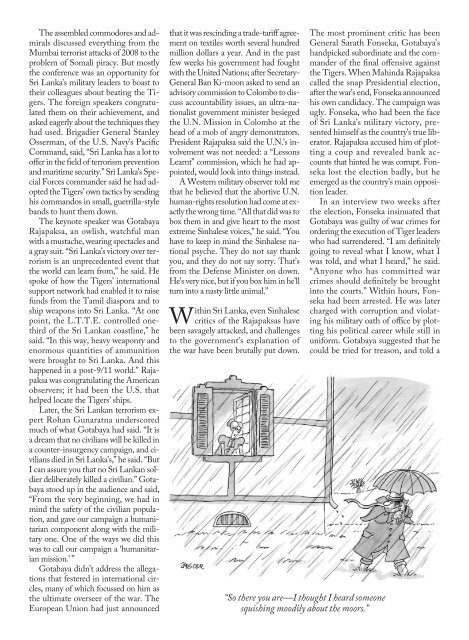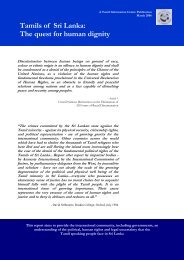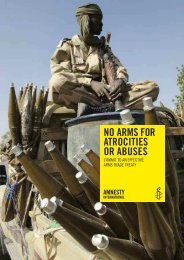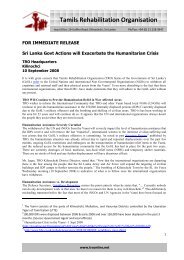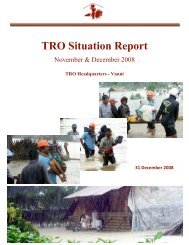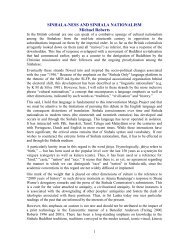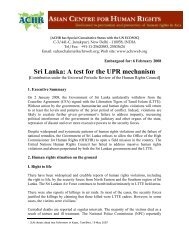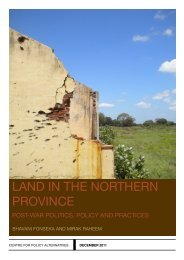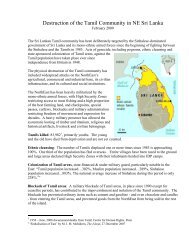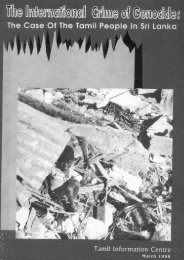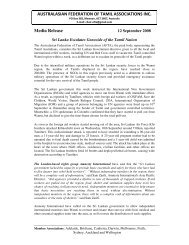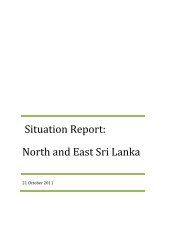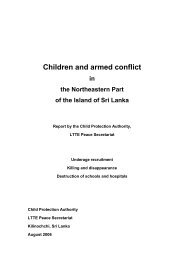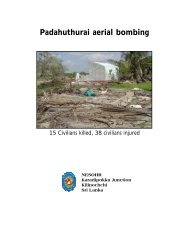The assembled commodores and admiralsdiscussed everything from <strong>the</strong>Mumbai terrorist attacks <strong>of</strong> 2008 to <strong>the</strong>problem <strong>of</strong> Somali piracy. But mostly<strong>the</strong> conference was an opportunity forSri Lanka’s military leaders to boast to<strong>the</strong>ir colleagues about beating <strong>the</strong> <strong>Tiger</strong>s.The foreign speakers congratulated<strong>the</strong>m on <strong>the</strong>ir achievement, andasked eagerly about <strong>the</strong> techniques <strong>the</strong>yhad used. Brigadier General StanleyOsserman, <strong>of</strong> <strong>the</strong> U.S. Navy’s PacificCommand, said, “Sri Lanka has a lot to<strong>of</strong>fer in <strong>the</strong> field <strong>of</strong> terrorism preventionand maritime security.” Sri Lanka’s SpecialForces commander said he had adopted<strong>the</strong> <strong>Tiger</strong>s’ own tactics by sendinghis commandos in small, guerrilla-stylebands to hunt <strong>the</strong>m down.The keynote speaker was GotabayaRajapaksa, an owlish, watchful manwith a mustache, wearing spectacles anda gray suit. “Sri Lanka’s victory over terrorismis an unprecedented event that<strong>the</strong> world can learn from,” he said. Hespoke <strong>of</strong> how <strong>the</strong> <strong>Tiger</strong>s’ internationalsupport network had enabled it to raisefunds from <strong>the</strong> <strong>Tamil</strong> diaspora and toship weapons into Sri Lanka. “At onepoint, <strong>the</strong> L.T.T.E. controlled onethird<strong>of</strong> <strong>the</strong> Sri Lankan coastline,” hesaid. “In this way, heavy weaponry andenormous quantities <strong>of</strong> ammunitionwere brought to Sri Lanka. And thishappened in a post-9/11 world.” Rajapaksawas congratulating <strong>the</strong> Americanobservers; it had been <strong>the</strong> U.S. tha<strong>the</strong>lped locate <strong>the</strong> <strong>Tiger</strong>s’ ships.Later, <strong>the</strong> Sri Lankan terrorism expertRohan Gunaratna underscoredmuch <strong>of</strong> what Gotabaya had said. “It isa dream that no civilians will be killed ina counter-insurgency campaign, and civiliansdied in Sri Lanka’s,” he said. “ButI can assure you that no Sri Lankan soldierdeliberately killed a civilian.” Gotabayastood up in <strong>the</strong> audience and said,“From <strong>the</strong> very beginning, we had inmind <strong>the</strong> safety <strong>of</strong> <strong>the</strong> civilian population,and gave our campaign a humanitariancomponent along with <strong>the</strong> militaryone. One <strong>of</strong> <strong>the</strong> ways we did thiswas to call our campaign a ‘humanitarianmission.’ ”Gotabaya didn’t address <strong>the</strong> allegationsthat festered in international circles,many <strong>of</strong> which focussed on him as<strong>the</strong> ultimate overseer <strong>of</strong> <strong>the</strong> war. TheEuropean Union had just announcedthat it was rescinding a trade-tariff agreementon textiles worth several hundredmillion dollars a year. And in <strong>the</strong> pastfew weeks his government had foughtwith <strong>the</strong> United Nations; after Secretary-General Ban Ki-moon asked to send anadvisory commission to Colombo to discussaccountability issues, an ultra-nationalistgovernment minister besieged<strong>the</strong> U.N. Mission in Colombo at <strong>the</strong>head <strong>of</strong> a mob <strong>of</strong> angry demonstrators.President Rajapaksa said <strong>the</strong> U.N.’s involvementwas not needed: a “LessonsLearnt” commission, which he had appointed,would look into things instead.A Western military observer told methat he believed that <strong>the</strong> abortive U.N.human-rights resolution had come at exactly<strong>the</strong> wrong time. “All that did was tobox <strong>the</strong>m in and give heart to <strong>the</strong> mostextreme Sinhalese voices,” he said. “Youhave to keep in mind <strong>the</strong> Sinhalese nationalpsyche. They do not say thankyou, and <strong>the</strong>y do not say sorry. That’sfrom <strong>the</strong> Defense Minister on down.He’s very nice, but if you box him in he’llturn into a nasty little animal.”Within Sri Lanka, even Sinhalesecritics <strong>of</strong> <strong>the</strong> Rajapaksas havebeen savagely attacked, and challengesto <strong>the</strong> government’s explanation <strong>of</strong><strong>the</strong> war have been brutally put down.The most prominent critic has beenGeneral Sarath Fonseka, Gotabaya’shandpicked subordinate and <strong>the</strong> commander<strong>of</strong> <strong>the</strong> final <strong>of</strong>fensive against<strong>the</strong> <strong>Tiger</strong>s. When Mahinda Rajapaksacalled <strong>the</strong> snap Presidential election,after <strong>the</strong> war’s end, Fonseka announcedhis own candidacy. The campaign wasugly. Fonseka, who had been <strong>the</strong> face<strong>of</strong> Sri Lanka’s military victory, presentedhimself as <strong>the</strong> country’s true liberator.Rajapaksa accused him <strong>of</strong> plottinga coup and revealed bank accountsthat hinted he was corrupt. Fonsekalost <strong>the</strong> election badly, but heemerged as <strong>the</strong> country’s main oppositionleader.In an interview two weeks after<strong>the</strong> election, Fonseka insinuated thatGotabaya was guilty <strong>of</strong> war crimes forordering <strong>the</strong> execution <strong>of</strong> <strong>Tiger</strong> leaderswho had surrendered. “I am definitelygoing to reveal what I know, what Iwas told, and what I heard,” he said.“Anyone who has committed warcrimes should definitely be broughtinto <strong>the</strong> courts.” Within hours, Fonsekahad been arrested. He was latercharged with corruption and violatinghis military oath <strong>of</strong> <strong>of</strong>fice by plottinghis political career while still inuniform. Gotabaya suggested that hecould be tried for treason, and told a“So <strong>the</strong>re you are—I thought I heard someonesquishing moodily about <strong>the</strong> moors.”
BBC reporter that he should hang ifhe was found guilty. With Fonseka inprison, his wife carried on a campaignin his name for a subsequent parliamentaryelection, which he won, eventhough his loyalists were harassed and,in some cases, abducted by plainclo<strong>the</strong>sthugs.In Colombo, a Sinhalese humanrightslawyer said, “The Fonseka caseshows people that <strong>the</strong> Rajapaksas willgo after anyone seen as a threat. Theydefeated <strong>the</strong> L.T.T.E. and have decimated<strong>the</strong>ir main political opposition,and now <strong>the</strong>y are going after thosewho are critical <strong>of</strong> <strong>the</strong>m.” The governmenthas acted unsparingly againstjournalists, human-rights activists,civic leaders, and o<strong>the</strong>rs. In <strong>the</strong> mostnotorious case, in January, 2009, <strong>the</strong>prominent newspaper editor LasanthaWickrematunge was attacked as hedrove to work in Colombo’s city center;motorcycle-riding assailants forcedhis car to stop and fatally shot himin front <strong>of</strong> dozens <strong>of</strong> onlookers. At<strong>the</strong> time <strong>of</strong> his murder, his newspaper,<strong>the</strong> Sunday Leader, was being suedfor defamation by Gotabaya Rajapaksaafter it implicated him in allegedcorruption.A few days later, <strong>the</strong> newspaper ranan editorial titled “And Then TheyCame for Me,” which Wickrematungehad left behind in <strong>the</strong> event <strong>of</strong> hismurder. In it, he excoriated MahindaRajapaksa, whom he described as anold friend who had become powerhungryand corrupt, for underminingSri Lanka’s democracy through stateterror. “Murder has become <strong>the</strong> primarytool whereby <strong>the</strong> state seeks tocontrol <strong>the</strong> organs <strong>of</strong> liberty,” he wrote.“When finally I am killed, it will be<strong>the</strong> government that kills me.” AddressingRajapaksa, he predicted, “In<strong>the</strong> wake <strong>of</strong> my death I know youwill make all <strong>the</strong> usual sanctimoniousnoises and call upon <strong>the</strong> police to holda swift and thorough inquiry. But likeall <strong>the</strong> inquiries you have ordered in<strong>the</strong> past, nothing will come <strong>of</strong> thisone, too.”In an interview afterward with Time,President Rajapaksa was asked aboutWickrematunge. “He was a good friend<strong>of</strong> mine. He had informed somebody toinform me” that he was in danger, hesaid. “But unfortunately, I didn’t getthat message. I would have told him togo to <strong>the</strong> nearest police station. No oneknows what happened.”Gotabaya Rajapaksa received JamesClad and me in a sitting room <strong>of</strong>his house, a British-era villa in a largegarden compound in Colombo. Theroom was impersonally furnished withfifties-style blue settees and abstractgeometric paintings, all governmentissue.The Defense Minister was casuallyattired in a T-shirt, sweatpants,and flip-flops. He coughed in a compulsiveway, as if he had a nervous tic.It was a little before <strong>the</strong> dinner hour, sohe called for an orderly to bring in <strong>the</strong>liquor trolley. He didn’t drink, he said,and didn’t know what he had in <strong>the</strong>house. He knew only that he had abottle <strong>of</strong> “Fonseka.” Would we like adrink <strong>of</strong> that? He grinned. On <strong>the</strong> trolleywas a bottle <strong>of</strong> Fonseca Bin No. 27,a brand <strong>of</strong> port. He laughed delightedlyat his joke. He had a high-pitchedgiggle, which broke out at odd momentsthroughout <strong>the</strong> evening.That was <strong>the</strong> day that Sri Lanka’s papershad carried <strong>the</strong> news that a militarycourt had convicted Fonseka <strong>of</strong> involvementin politics while in service andstripped him <strong>of</strong> his rank and militaryhonors. (He was later sentenced to thirtymonths in prison.) I suggested that <strong>the</strong>timing <strong>of</strong> Fonseka’s arrest—only hoursafter he had accused Gotabaya <strong>of</strong> warcrimes—made it look like a personalvendetta. Gotabaya coughed and giggledand waved his hands dismissively. “No,no. He made those same accusationsduring <strong>the</strong> campaign, many times. Icould have arrested him <strong>the</strong>n if it wasabout that. In fact, I should have arrestedhim earlier.”Gotabaya evinced a grudging admirationfor Prabhakaran, for his “ruthlessdedication to his cause,” but acknowledgedthat he had felt “very happy” whenhe was told <strong>of</strong> his death. As for Sri Lanka’snational reconciliation, Gotabayasaid that he believed his bro<strong>the</strong>r’s proposals,to win <strong>the</strong> peace through economicdevelopment, showed <strong>the</strong> rightway forward. The average <strong>Tamil</strong>, like<strong>the</strong> average Sinhalese, he said, justwanted to get on with his life. Referringto <strong>the</strong> <strong>Tamil</strong>s’ long-standing wish forsecession, he said, “All that businessabout separation is something only politicianscare about.” When I asked about<strong>the</strong> suspicions that <strong>the</strong> government wasattempting to change <strong>the</strong> demographics<strong>of</strong> <strong>the</strong> <strong>Tamil</strong> lands by swamping <strong>the</strong>mwith Sinhalese soldiers, he said, with alaugh, “We should do that, but it’sdifficult.”Clad gently lobbied Gotabaya torenew <strong>the</strong> country’s relationship with<strong>the</strong> International Committee <strong>of</strong> <strong>the</strong>Red Cross. In <strong>the</strong> last days <strong>of</strong> <strong>the</strong> war,<strong>the</strong> I.C.R.C. had been restricted to removingwounded civilians from Mullaittivuby sea, and ever since it had beengrounded at its headquarters in Colombo.In <strong>the</strong> final months <strong>of</strong> <strong>the</strong> war,<strong>the</strong> Army had repeatedly bombed <strong>the</strong>I.C.R.C.’s emergency hospital facilities,killing three employees and scores <strong>of</strong>patients. Gotabaya had blamed <strong>the</strong> <strong>Tiger</strong>s.In a report prepared by <strong>the</strong> InternationalCrisis Group, “War Crimes inSri Lanka,” <strong>the</strong> hospital attacks featurestrongly in <strong>the</strong> case against Gotabaya.Gotabaya warily said that he waswilling to have <strong>the</strong> Red Cross stay on if<strong>the</strong> organization would agree to a newunderstanding <strong>of</strong> its activities on <strong>the</strong> island.“We must forget <strong>the</strong> past and lookto <strong>the</strong> future,” he said. Lowering hisvoice confidentially, he added, “Theproblem is <strong>the</strong> I.C.R.C.—some <strong>of</strong> <strong>the</strong>irpeople had been here for a long time,and became friendly with <strong>the</strong> L.T.T.E.”He suggested that <strong>the</strong> Red Cross ando<strong>the</strong>r international relief agencies werelong-time accomplices <strong>of</strong> <strong>the</strong> <strong>Tiger</strong>s. InDecember, 2006, he had nearly been assassinatedby a Black <strong>Tiger</strong> driving arickshaw rigged with explosives; hepointed out that <strong>the</strong> bomber had beena <strong>Tamil</strong> employee <strong>of</strong> <strong>the</strong> relief organizationCARE. He said, “So I say to <strong>the</strong>I.C.R.C., ‘Bring new people and let’shave a fresh start.’ ”After dinner, Gotabaya led us outside.Across his lawn, by <strong>the</strong> garden’shigh security wall, was a huge, illuminatedoutdoor aquarium. Inside, severallarge, unmistakable shapes moved relentlesslyback and forth.54 THE NEW YORKER, JANUARY 17, 2011


